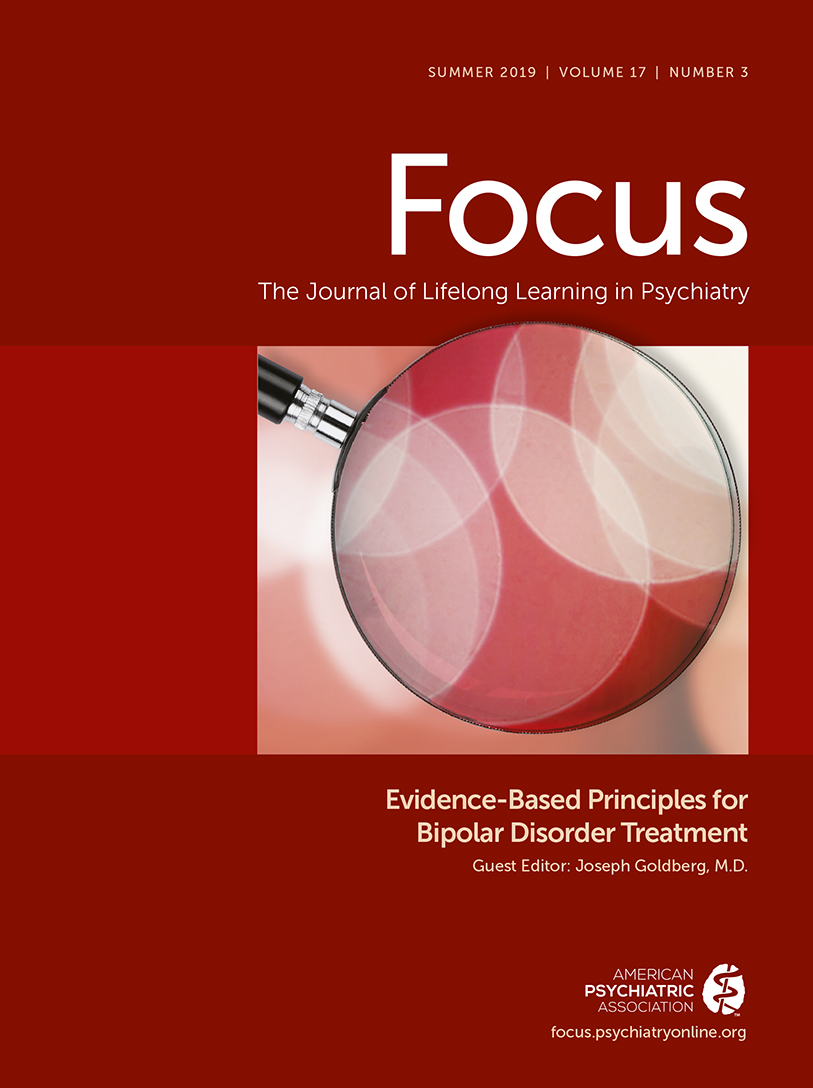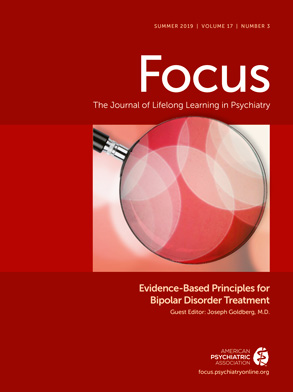How do you treat a patient with bipolar I disorder who is experiencing depression?
The depressive pole of bipolar disorder can be painful and unrelenting. When patients are experiencing depression, their functioning deteriorates, their cognition is impaired, and their will to live is tested. Thirty-six percent of patients with bipolar I disorder will try to take their lives (
1), and 15%−20% of all deaths among patients with bipolar disorder are due to suicide (
2).
The need to resolve the symptoms of bipolar depression is great, but the selection of medications can be challenging. To assist clinicians, various psychiatric organizations have developed practice guidelines for bipolar disorder (
3–
5), but these guidelines prioritize the same medications differently, creating uncertainty for prescribers. To guide my choices in treatment, I use these guidelines along with treatment principles that I have developed after years of working in a bipolar disorders outpatient clinic. Below, I discuss these principles, which inform my overall approach to working with patients who have bipolar I disorder and are experiencing depression.
Rule Out the Basics
When psychiatrists are working with a patient experiencing bipolar depression, it is important to identify illicit drug use or alcohol use that may be contributing to the depression. Drug and alcohol dependence are seen among 30.4% and 38%, respectively, of patients with bipolar I disorder (
6). Use of these substances can induce depression and make medication treatments futile. Therefore, if a patient is unable to refrain from use, he or she should be referred to an addiction treatment program. Additionally, the patient’s medication adherence should be evaluated, because the depression may interfere with the patient’s memory (
7) or desire to take medicine (
8). Efforts to improve the patient’s adherence, either with daily directly observed treatment by a family member or with the use of a pill box, are advised.
Work With What You Have
Before prescribing new medicines that can introduce additional side effects, evaluate what the patient is already taking when he or she first presents. If the patient is already on a mood stabilizer (e.g., lithium, valproate, carbamazepine, lamotrigine), an antipsychotic, or an antidepressant, the dosage may not be at a therapeutic level. Consider pushing the doses higher as tolerated or obtaining drug plasma levels to determine the optimal dose.
Think Long Term
There are several medications that have some degree of efficacy in treating the depressive pole of bipolar disorder. To reduce unnecessary polypharmacy, select the medicine with efficacy in the greatest number of phases (mania, depression, euthymia), taking into account any contraindications for the patient. Most of the medicines included in the mood stabilizer category meet this criterion, and for that reason I often prescribe them early in treatment.
Everyone Deserves a Trial of Lithium, and Sometimes a Retrial
Lithium is the only medicine with efficacy data for acute mania, acute depression, and the prevention of new mood episodes. Second-generation antipsychotics have demonstrated a reduced risk of relapse after remission in relapse-prevention studies. These studies were enriched for participants who responded to the antipsychotic during the acute episode.
Conversely, lithium has demonstrated an ability to prevent new episodes in studies using a prophylactic design. In these studies, participants with or without an earlier response to lithium were eligible and were enrolled for up to two years (
9). The prophylactic study results suggest that compared with second-generation antipsychotics, lithium may be efficacious for a larger sample of patients with bipolar disorder. Additionally, lithium has antisuicidal and antidementia properties and has been shown to reduce mortality (
10). For patients who have taken lithium in the past, a retrial may be appropriate if you suspect that it was underdosed or overdosed during the initial trial.
Don’t Fear Polypharmacy
The mechanisms of action within the class of mood stabilizer medications are significantly different from one another and in comparison with medications in other classes to warrant combination strategies for those who do not respond to monotherapy. Adjunctive bipolar depression studies show that combining certain medications, such as lithium and lamotrigine (
11), lithium and lurasidone (
12), or valproate and lurasidone (
12), is superior to continuing monotherapy with lithium or valproate among patients who do not respond to treatment. Unfortunately, no studies of bipolar disorder have evaluated the effect of adding a second medication rather than switching to another medication for patients who do not respond to the initial treatment. My experience has shown that when we add medications and achieve remission, removal of the first medicine often leads patients to relapse. This suggests that additive or synergistic effects from polypharmacy may be necessary for remission.
Avoid Antidepressant Monotherapy for Patients With Bipolar I Disorder
Few maxims in psychopharmacology exist, but this is one. Data show that although some patients with bipolar II disorder can tolerate and benefit from antidepressant monotherapy (
13), those with bipolar I disorder are at greater risk of becoming manic, developing a mixed state, or having increased episode cycling (
14). However, antidepressant use is not contraindicated in bipolar I when added to a mood stabilizer, and for some patients it prevents depression recurrence (
15).
Use Comorbidities and Illness Characteristics to Help With Next-Step Treatment Selection
If a patient with depression who is on a mood stabilizer has an active, comorbid anxiety disorder, then consider adding an antidepressant to his or her regimen. If a patient with depression is obese or has significant cardiometabolic disease, then it may be best to avoid second-generation antipsychotics and to add an antidepressant or an additional mood stabilizer instead. If a patient is cycling in and out of depression, then it may be best to avoid an antidepressant and add a second-generation antipsychotic or an additional mood stabilizer.
Prepare Patients for the Long Run
When I first meet a patient, I tell him or her that depression may resolve with the first medication change but more likely will require multiple changes and at least a few months. I explain that my goal is to suppress the depressive symptoms without inducing mania and that if we cannot attain full suppression, there at least should be some relief. I encourage patients to pursue psychotherapy to help manage the suffering as we wait for medications to take effect. I also clarify that if the symptoms of their illness worsen or if they cannot endure through additional medication trials, then we may consider electroconvulsive therapy sooner rather than later. The patient with depression who finds little relief must be reassured that there is hope for improvement and that a number of novel treatments (e.g., ketamine, supraphysiologic thyroid, bright-light therapy) remain.
Conclusion
The treatment of bipolar I depression can be frustrating and overwhelming for both patient and psychiatrist. With polypharmacy, side effects may emerge, raising questions about whether the most recent medicine should be removed or whether an additional medicine to treat the side effects should be added. Many patients swallow a large number of pills over the course of the day, which can be a painful reminder of their illness and can be physically exhausting. In addition, while psychiatrist and patient journey on the long path to remission, job and relationship losses for the patient may accumulate, and suicide risk may ebb and flow.
The good news is that for many patients, combinations of mood stabilizers, antipsychotics, and antidepressants along with weekly psychotherapy can lead to remission. However, to reach that goal, psychiatrists must be tenacious and must discover a way to incorporate practice guidelines within the frame of an overarching treatment philosophy.

